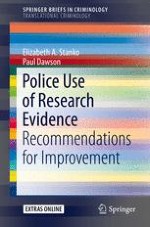2016 | OriginalPaper | Buchkapitel
The Challenge in Making Effective Research Influence Policing
verfasst von : Elizabeth A. Stanko, Paul Dawson
Erschienen in: Police Use of Research Evidence
Aktivieren Sie unsere intelligente Suche, um passende Fachinhalte oder Patente zu finden.
Wählen Sie Textabschnitte aus um mit Künstlicher Intelligenz passenden Patente zu finden. powered by
Markieren Sie Textabschnitte, um KI-gestützt weitere passende Inhalte zu finden. powered by
